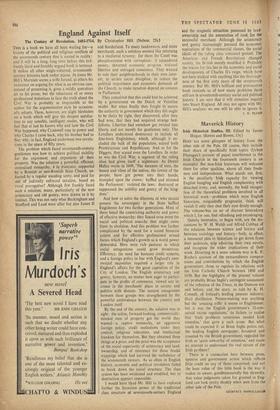Maverick History
HERE are some glimpses of history from the other side of the Pale. Of course, they include their share of specifically Irish topics (Urban Flanagan's account of papal interference in the Irish Church in the fourteenth century is an example). But non-Irish historians will welcome them for other qualities, above all their fresh- ness and independence. What stands out, first, is the peculiarly Irish capacity for viewing English bungling and English complacency with detached irony, and, secondly, the bold recogni- tion of the theoretical problems involved in all historical work--problems which most English historians, misguidedly pragmatist, think will vanish if only they shut their eyes firmly enough. The volume-has an air of discreet heterodoxy which I, for one, find refreshing and encouraging.
Quietly heterodox,.to begin with, are the dis- cussions by W. H. Walsh and Alfred Cobban of thz relations between science and history and between sociology and history—both, in effect, a measured plea to historians to get down from their pedestals, stop admiring their own navels, and recognise the wider implications of their work. Diverting in a more solemn way is K. F. Roche's account of the extraordinary compro- mises and convolutions by which the English government chose to regulate its relations with the Irish Catholic Church between 1800 and 1850. But the highlights of the present volume are probably Brian Inglis's astringent assessment of the influence of the Times, in the Dawson era and before, and the story, as told by K. H. Connell, of Ireland's leading peasant industry, illicit distillation. Poteen-making was anything but the 'amusing trifle' it seems to Englishmen; but it was the English government's 'ill-con- ceived excise regulations,' its failure to realise that 'Irish problems sometimes needed Irish remedies,' that gave it such scope. But what could be expected if, as Brian Inglis points out, the leading English newspaper, favoured and cosseted by the British government, regarded the Irish as 'quite unworthy of attention,' and made no attempt to understand the real nature of the Irish problem?
There is a connection here between press, opinion and government action which reflects little credit on any of those concerned; and not the least value of this little book is the way it makes us aware, goodhumouredly but shrewdly, that value judgments taken for granted in Eng- land can look pretty shoddy when seen from the other side of the Pale.
GEOFFREY BARRACLOUGIII










































 Previous page
Previous page